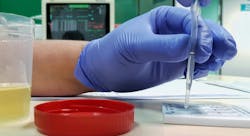DOT to remove oral drug testing requirement as 'factual impossibility'
The Department of Transportation is revising a requirement that it calls an “inadvertent factual impossibility” from its drug testing procedures.
A provision from DOT’s 2023 oral fluid drug testing rule requires oral fluid samples under specific scenarios—but, to this day, oral fluid testing is not possible for DOT. The department this month issued a notice of proposed rulemaking to correct the drug testing provision that the department deemed “impossible to comply with.”
The department officially sanctioned oral fluid testing in June 2023 when a final rule approved the method as an alternative to urinalysis. In that rule, most changes allowed employers the flexibility to choose between urinalysis or oral fluid testing—but one provision required exclusively oral fluid testing.
The provision, 40.67(g)(3), describes the direct observation of urine sample collection. For direct observation of a urine sample, the sample collector must be the same gender as the employee. If the testing facility cannot find a collector of the same gender—or in cases with nonbinary or transgender employees—the collector must instead conduct an oral fluid test.
See also: A peek at FMCSA’s new online registration system
However, oral fluid testing is still not implemented for transportation employees: the Department of Health and Human Services has never yet certified an oral fluid testing laboratory. The department would need to certify at least two labs to enable DOT oral fluid testing.
Until HHS certifies enough laboratories to make oral fluid drug testing possible, DOT is proposing to modify the provision to rely on urinalysis. Under the proposed provision’s gender scenario, collectors would need to continue using directly observed urine tests.
HHS is the main government entity blocking alternative DOT drug tests today. Many industry organizations and lawmakers have asked HHS to certify oral fluid labs and establish guidance for hair testing.
DOT is accepting comments on its proposed rule until January 8.
About the Author
Jeremy Wolfe
Editor
Editor Jeremy Wolfe joined the FleetOwner team in February 2024. He graduated from the University of Wisconsin-Stevens Point with majors in English and Philosophy. He previously served as Editor for Endeavor Business Media's Water Group publications.

